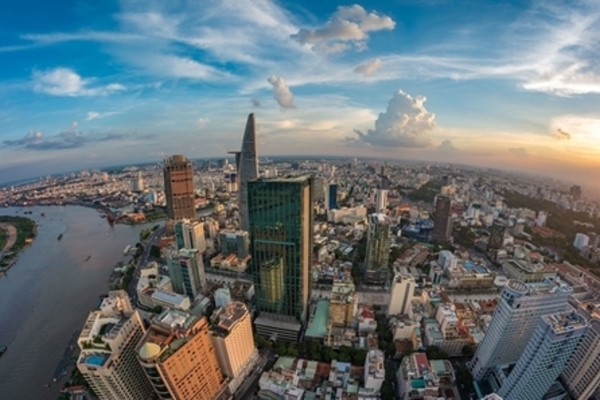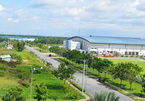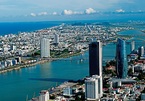 |
|
Viet Nam's real estate market continues to attract foreign investors because of its growth potential. — Photo tbck.vn
|
In a survey by KB Securities, more than half of South Korean-won billionaires had expressed a desire to invest in real estate in Viet Nam, said Nguyen Hoai An, director of CBRE Viet Nam, at a press conference releasing the quarterly report on Ha Noi’s real estate market in the third quarter (Q3) of this year held in Ha Noi on October 9.
"We have seen a trend of Korean investors buying houses in Viet Nam over the past 4-5 years. This trend has been continuing this year both in Ha Noi and HCM City," An said.
"They have been the most exciting foreign home-buyers in Viet Nam for many years and the trend shows no sign of stopping."
Customers of CBRE Viet Nam said they were interested in Viet Nam's real estate market because the domestic economy was expected to see rapid growth in the coming years, An said.
Housing prices in Viet Nam were attractive compared to their country, she said. For example, the average price of high-end housing was about $2,000 per sq.m in Viet Nam while the price of a similar product in South Korea was about $15,000-20,000 per sq.m.
The attractiveness of Viet Nam's real estate market is explained by a number of factors, such as attractive selling prices, high profit potential and high quality products, according to Nguyen Khanh Duy, Director of HCM City Residential Sales, Savills Viet Nam’s branch in HCM City.
Viet Nam also amended legal regulations to create favourable conditions for foreigners buying property products in Viet Nam, he said.
"Apartment prices in HCM City and Ha Noi are generally lower than other cities such as Kuala Lumpur and Bangkok, despite much stronger growth," Duy said. New home prices in the centre of HCM City are now between $5,500 and $6,500 per sq.m.
Relatively low real estate tax in Viet Nam also attracts buyers both at home and abroad, according to Duy.
Therefore, it is not surprising that the demand for real estate investment in Viet Nam has increased significantly since 2015, when the amended housing law opened the local market to foreign investors.
Foreign investors expect those prices to increase in the coming years, according to An.
"Viet Nam's real estate market will continue developing. However, the prices will not be so high in the short term and Viet Nam needs many years to have real estate prices approaching those in developed countries," she said.
"Growth of real estate prices will depend on economic development and Vietnamese people’s ability to increase their incomes."
"HCM City has been and will remain an attractive property market for foreign investors," An said.
"In the first nine months, besides South Korean investors, we saw investors from many other countries and territories pay more attention to the property market in Ha Noi, including investors from Hong Kong, Taiwan and Singapore."
In Ha Noi, the western region had attracted foreign investors to buy and rent real estate products, especially from My Dinh to West Lake, she said.
There are many advantages in developing property for foreign investors when they like the domestic real estate market and consider it an attractive market, according to An.
However, to attract foreign investors, real estate companies must pay attention to many factors, especially foreign languages. This means ensuring staff can speak foreign languages and brochures are translated to introduce products easily to foreign customers.
"This is considered a challenge for domestic property companies because not all of them pay attention to this factor even though they know the importance of foreign languages."
Other issues relate to property products, including the development of property meeting customers’ demands and the representatives of foreign owners managing and trading real estate when they are not in Viet Nam.
"If property companies target foreign customers, they need to pay attention to these factors," An said.
Condominiums
According to CBRE Viet Nam’s quarterly report on the Ha Noi property market in Q3 released on October 9, there were nearly 6,100 units launched from 18 projects in Ha Noi, down by 33 per cent quarter on quarter (q-o-q), leading to a total of 26,800 newly launched units during the first nine months of this year, up by 37 per cent year on year (y-o-y).
Launched projects in this quarter were mostly located in the west of the city, accounting for 77 per cent of total newly launched units.
Noticeably, Ha Noi’s residential market showed a clear trend of decentralisation given increasing new projects launched in the farther districts such as Thanh Tri and Hoai Duc districts.
In terms of sales performance, more than 4,800 units were sold during Q3, down by 32 per cent q-o-q. Although there was a decrease in the number of sold units in this quarter, the ratio of sold units to newly launched was on par with previous quarters showing stable market conditions.
In terms of pricing, the average primary pricing in Q3 was stable in comparison with the previous quarter, but recorded an increase of 3 per cent y-o-y, averaging $1,337 per sq.m.
Together with the expansion of the residential market, the affordable segment is moving farther and farther away. For instance, the projects’ locations were typically more than 10km from Ha Noi’s central business districts (CBD), according to CBRE Viet Nam. In comparison, affordable products launched in 2019 are typically within a 10-13 km radius from Ha Noi’s CBD with relatively stable pricing.
In the last quarter of 2019, 7,000 units are expected to be launched, bringing the total new launch in 2019 to around 33,000 units, up by 9 per cent y-o-y. New supply will mostly come from township developments such as Vinhomes Ocean Park, Vinhomes Smart City or Park City.
Primary pricing is expected to experience an upwards trend reaching near $1,360 per sq.m on average at year end.
Providing active sales and marketing activities and improvements in product offerings, sales momentum is forecast to maintain a positive level achieving around 85-90 per cent of total new launch during the year. — VNS

Vietnam's industrial real estate attracting investors amid global uncertainty: JLL
Trade tensions between the US and China are driving increased real estate investor interest in Southeast Asian countries, with Vietnam’s industrial sector a key focal point, according to JLL Vietnam.

Industrial real estate thrives on FDI increase
Existing factors in the market, especially strong FDI inflow, all are supporting the prosperity of the industrial real estate market.

In Vietnam, resort real estate sees setback in sales
After a hot development period, resort real estate is facing challenges because of an oversupply of villas and condotels.